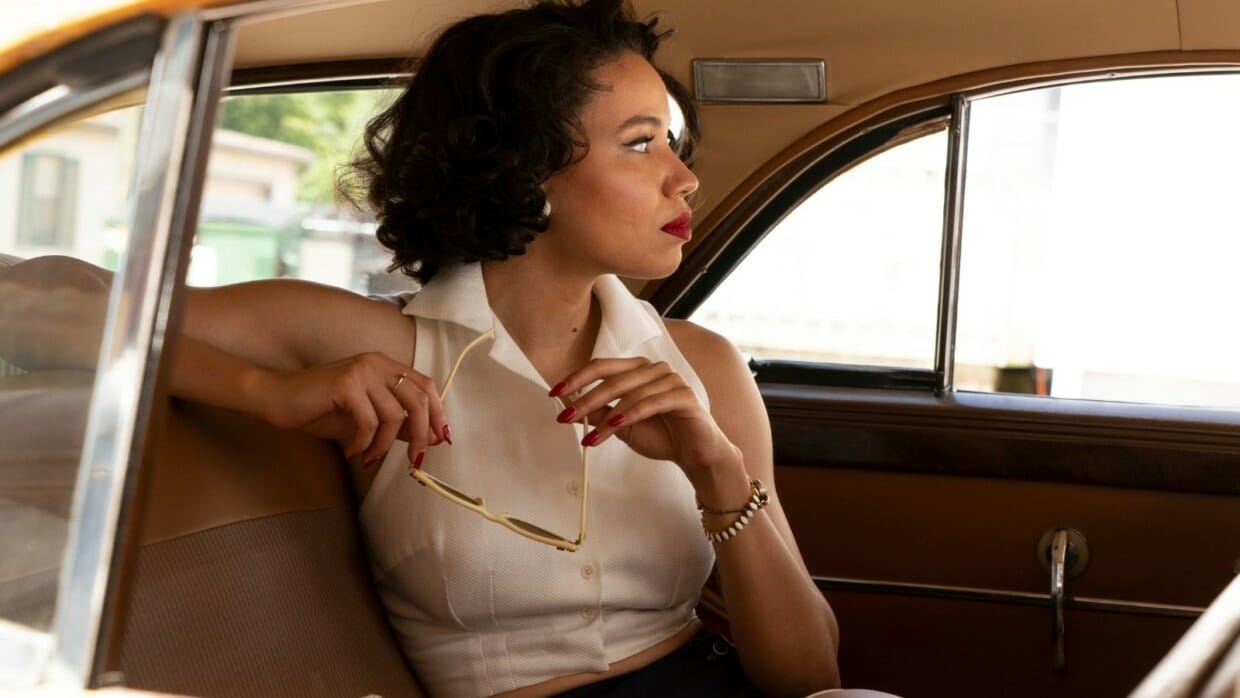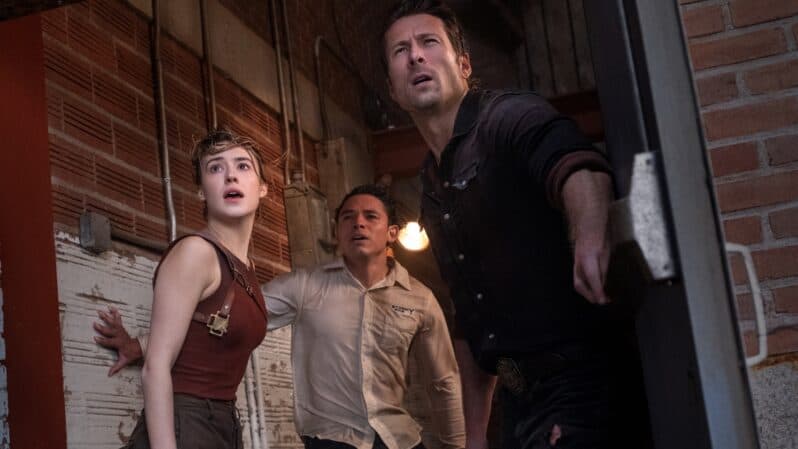
30 September 2020
Jurnee Smollett felt “shut out of horror” until Lovecraft Country
The first eight episodes of HBO’s brand-new horror drama Lovecraft Country are streaming on Showmax. Based on the 2017 World Fantasy Award-nominated cult novel by Matt Ruff, Lovecraft Country is exec produced by Oscar winner Jordan Peele (Get Out, Us) and Emmy winner JJ Abrams (Star Wars, Super 8), with Misha Green (Underground) as the showrunner and co-creator.
In the 1950s, Atticus, a young African-American, sets out on a road trip with his childhood friend Letitia and his uncle George to find his missing father. This catapults the three into a struggle for survival against the dual terrors of Jim Crow-era America and terrifying monsters that could be ripped from a paperback written by pulpy horror author HP Lovecraft.
We caught up with Teen Choice nominee Jurnee Smollett (Birds of Prey, Friday Night Lights) to find out more about playing Leti – a performance that The Hollywood Reporter called “a fierce turn in which her every bit of actorly business – whether driving a car, sprinting away from ghouls or wielding a baseball bat … feels instantly iconic. You can’t take your eyes off her.”
What drew you to this project?
I was just so drawn to Leti’s spirit, that has so many contradictions. She leaves her home in search of a home, and she’s desperately trying to be reborn and to shed her old self. It played with this feeling of displacement, which I can really relate to, as being a black American, one does suffer from that feeling of displacement.
You worked with showrunner Misha Green on Underground. Was that part of Lovecraft Country’s appeal for you?
When we initially worked together on Underground on the pilot, I couldn’t stand her and she couldn’t stand me. We hated each other and fought a lot, because we both have very strong personalities. Then, once we got through that, we learned each other’s love language and became incredibly close through the seasons.
After she wrote the pilot, she casually sent it to me to read, just as a friend. Just the first few pages made me truly miss her style of writing and her brilliance. Then when we got to Leti in the script, the way she’s introduced, I mean, within the first few minutes, I was like, ‘There’s no one that can play this role other than me and why has Misha not talked to me about this role?’
So I became obsessed, and by the time I finished reading the pilot, it was the thing that I was now losing sleep about.
By the time we got on the set of Lovecraft, I just knew her voice so well, and she knows my process so well that it was just a very fluid experience. We have a shorthand with each other by now.
Are you a fan of sci-fi and horror?
I mean, listen, horror, sci-fi, thriller – these are genres that I grew up loving just like anybody else. I remember seeing The Silence of the Lambs when I was 10 years old at a sleepover my sister was having with her girlfriends and I slept over in the living room with them because I thought I was cool. And I remember Hannibal and just being struck by this ability to use terror in such an effective way.
Yet it’s been a genre unfortunately that as an artist I’ve just felt shut out from. It’s not that I haven’t been offered the roles or had the opportunity to play in it but far too often it’s these genres that have just unfortunately erased us as black artists. Oftentimes, I would just be yelling at my agent, saying ‘I don’t want to be the black chick that dies on page 33,’ which unfortunately is how a lot of writers write our characters in these genres. So it was quite frustrating to feel shut out from something that I was a fan of.
Also, I didn’t want to sacrifice my artistic integrity and do something that I didn’t feel creatively stimulated by. Over the years, I’ve been quite excited by people like Jordan Peele. Now, seeing how Misha is just flipping this genre on its head and completely reimagining it in such a radical way, in centering black voices in a genre in which we’ve been shut out from for so long, is just thrilling to me, frankly.
The show is centred in 1950s segregated America but often it feels quite current.
The unfortunate thing about the systemic racism that has existed in our nation since 1619 is that this show could have been released on any day, in any month of any year since 1619 and unfortunately, the themes we explore would have been relevant. Because we as a nation haven’t fully healed and confronted systemic racism, and have yet to truly dismantle it. The unfortunate thing is that, yes, these themes are timely in our show, but name me a time that they wouldn’t be?
Seeing Leti and Ruby sing together was beautiful. What was that like on set and rehearsals?
In rehearsals, Wunmi and I were really trying to get the steps right and so working hard at it. Misha came by once and just said, “Ladies, just have fun. I mean, think about the moment of Beyonce and Solange on stage at Coachella.” We both laughed and we were like, “Oh, ahhhh, okay… got it.” Honestly, we just had fun with each other.
It’s truthful to explore the different colours of sisterhood. You love and hate each other ferociously and then you can get up on stage and go back to the memories of when you were kids in church dancing and singing and it’s muscle memory.
Leti’s relationship with her sister, Ruby, is quite a rocky one. How did you navigate that with this role?
I’m very close with all five of my siblings and I understand those differences in the dynamics. There’s that frustration that you have with your family where you’re just like, “No, see me for who I am. Everyone sees me for the mistakes and the fuckup that I made in the past, just see me for who I am now.” And there’s that sibling love, that bond that will never be torn apart.
However, I really was fascinated in exploring the animosity and resentment that they have towards each other because they’re both trying to heal from that mother-daughter split that they have. Leti obviously was estranged from her mother in a different way than Ruby but they both intensely resent their mother for not being the mother they needed her to be.
I loved working alongside Wunmi; she’s such a fiercely talented artist.
Leti is very independent and strong-minded, especially for a woman in the 1950s. Did you feel that resilience playing her?
I definitely felt that I had to lean into exploring her defiance and her ability to disrupt. I was so intrigued by her, by her unwillingness. She makes an active choice to reject everything that her mother represented. Along with that, she’s also rejecting the societal pressures or the societal ways that a woman should behave as a black woman in 1955.
She has that double jeopardy of being black and female. There were women who were like her and it’s how we got a Lorraine Hansberry because she said, “No, I shall use my voice. I won’t ask for permission to do it.” It’s how we got an Althea Gibson because she said, “I love to play tennis. By any means necessary, I’m going to become the best.” We come from such resilient women.
That’s why I say the story is very ancestral because I know these women. This is my mother. This is my grandmother. This is my auntie.
Growing up I heard stories about my grandmother, who was a beauty queen. She was the first Black Miss Galveston, Texas, and was a single mother raising four kids and cleaning white folks’ homes. But every single day, she would get up and, with the dignity of any other queen, she would get dressed and press out her clothes and make sure her hair was done and go to work and clean the homes of these families who neglected her. But she wouldn’t let them rob her of her dignity. And to me, growing up and hearing that about my grandmother, I think of how I approached Leti. She will fight, kick and scream to keep her dignity. It’s something that I admire so much about the DNA of the people we come from. It’s why we are here.
The monsters in the show are scary but one could say that the police and racism are monsters too — what do the monsters in Lovecraft Country symbolise to you?
Racism is a demonic spirit. This level of terror in our nation, it’s not just fictional, it’s real. I for sure feel that. Yes, the monsters represent a number of things, but at their worst, they represent the worst in America. But I won’t give too much away because there’s a little bit of evolution with the monsters…
Watch eps 1-8 of Lovecraft Country on Showmax now, with the last two episodes coming 20 October 2020, just after the US finale.
The Mommy Club NBO now streaming
The Chocolate Empire, now streaming
The best movies to stream

Here, and 15 more great movies to cry about
Whether you’re looking to shed happy tears or shed part of your soul, we have movies centred on love in all its forms to help you, starting with Tom Hanks and Robin Wright’s Here.

The best kids’ shows and movies to stream during school holidays
Showmax has loads of fun to look forward to during school holidays in June/July 2025, including blockbuster movies for the whole family.

Elphaba and Glinda’s Wicked little guide
Find out what Cynthia Erivo and Ariana Grande have to say about Wicked, pick up 10 magical behind-the-scenes facts, and explore 7 more schools of witchcraft and wizardry.

Twisters and 5 other man-versus-nature nail biters
Tornado alert! A category F5 spin on the blockbuster 1996 movie Twister has just touched ground to sweep us up in the terrifying power of nature. Find out about how it was made, and what to watch next.
